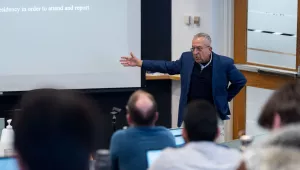Reconquering the Russian Far East: Civil War, Intervention, and Centralization
Speaker: Paul Behringer, Ernest May Fellow in History & Policy, International Security Program
In 1917–1918, the Russian state collapsed and its empire disintegrated. The Bolsheviks, having seized power in November 1917, managed to hold onto authority amid repeated challenges from domestic and foreign opponents in all directions. In October 1922, Lenin's party emerged victorious from the rubble of one of the most destructive civil wars in history. Historians have put forward several convincing arguments for why the Bolsheviks were able to win the overall struggle. But the fact that the new regime was also able to reconstitute much of the Russian Empire, extending all the way to the Pacific Ocean, is as astounding today as it was unlikely in 1918. This presentation attempts to explain this accomplishment by framing the civil war in the Russian Far East as a contest between geopolitical, social, ideological, and international forces of centralization and decentralization. Building on the most recent historiographic trends in the study of the Russian Civil War, it also speaks to political science research on the broader issues of intrastate conflict, foreign intervention, and violence.
Please join us! Coffee and tea provided. Everyone is welcome, but admittance will be on a first come–first served basis.




